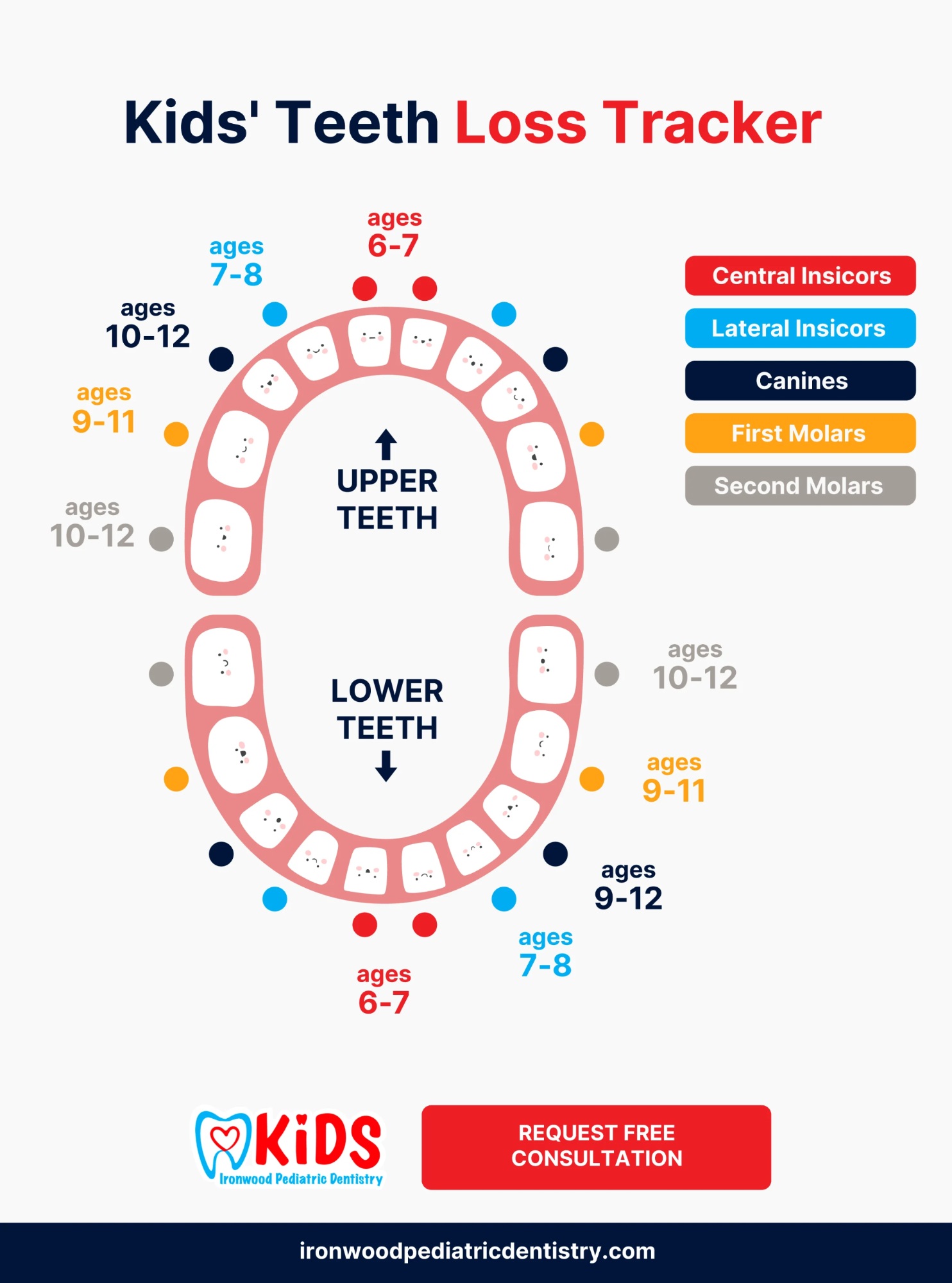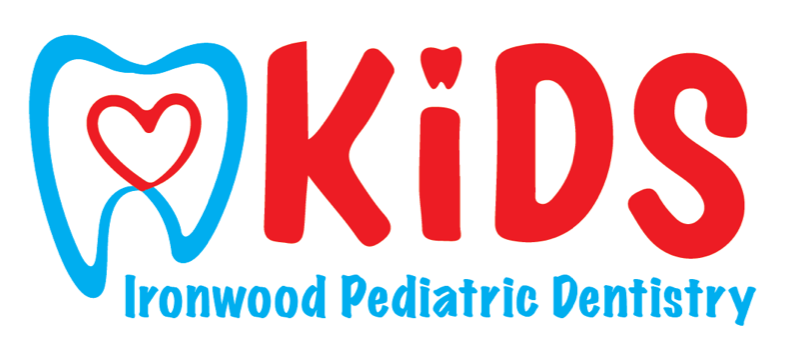As your children progress toward adolescence, their 20 primary or “baby” teeth must begin to make way for their permanent teeth, including their wisdom teeth. How and when kids start losing their first teeth is mostly up to nature, but there are some things you can do as a parent together with your child dentist to make this transition for your child as painless and comfortable as possible.
At Ironwood Dental, our pediatric dentists are experts in cost-effective tooth care for children, starting from the eruption of their first baby teeth all the way through when they are ready for adult teeth care.
How Primary Teeth (Baby Teeth) Come Out
When your child’s adult teeth are ready to start coming in, the roots of the baby teeth will begin to dissolve away to make room for them. Eventually, the root will disappear completely, leaving nothing to hold the baby tooth in but the surrounding gum tissue. This is when the tooth loosens and eventually comes out.
Children ordinarily begin to lose their baby teeth around age 6. Sometimes this process can begin as early as 4 years old, and in some cases it may not begin until age 7.
Primary Tooth Loss Timeline

A child’s baby teeth usually erupt in a predictable order, starting with the central incisors and then progressing through the lateral incisors, canines, and first and second molars. For most kids, the usual order of the loss of the baby teeth follows this same tooth eruption progression, beginning with the loss of the central incisors.
The typical order of baby tooth loss and the age range when they come out is:
|
Tooth |
When it usually comes out |
|
Lower central incisors |
Age 6 or 7 |
|
Upper central incisors |
Age 6 or 7 |
|
Upper lateral incisors |
Age 7 or 8 |
|
Lower lateral incisors |
Age 7 or 8 |
|
Lower canines |
Age 9 to 12 |
|
Upper canines |
Age 10 to 12 |
|
Upper first molars |
Age 9 to 11 |
|
Lower first molars |
Age 9 to 11 |
|
Lower second molars |
Age 10 to 12 |
|
Upper second molars |
Age 10 to 12 |
Frequently Asked Questions
Can baby teeth come out too early?
As you can see from the schedule above, when your child’s baby teeth come out can be subject to considerable variability. If your child begins to lose baby teeth at age 5, for example, this normally is not by itself a source of concern.
If your child starts to lose teeth before the age of four, however, this could be a symptom of tooth decay, or gum disease, or a rare but more serious dental condition like Papillon-Lefèvre syndrome, Chediak-Higashi syndrome, Hypophosphatasia, Neutropenia, or Langerhans cell histiocytosis. Your child’s pediatric dentist can recognize and treat these conditions.
Early tooth loss can lead to problems with the eruption of new teeth, because if a tooth falls out too soon the empty space it leaves behind could cause problems with proper alignment of the child’s permanent teeth later on.
Is there anything wrong if my child’s first primary tooth falls out after age 7?
Just as primary teeth can come out ahead of the usual schedule, they can be a little behind schedule, too. There is usually nothing wrong if your child’s primary teeth take up to a year longer than average to come out.
If, however, a primary tooth is more than a year late in coming out, this could be an indicator of a rare but serious dental condition like Andersen-Tawil syndrome, Autosomal dominant hyper IgE syndrome, or Osteopetrosis. Your child’s dentist can identify these or other potential issues through a dental examination and by analyzing x-rays of your child’s mouth.
Can I do anything to help my child with a loose tooth?
The loss of your child’s primary teeth to make way for their permanent adult teeth is an inevitable, natural process that can involve some minor discomfort. Ordinarily, there is little you can do, or need to do, to prepare for when your kids lose teeth.
To soothe loose teeth, having your child rinse out his or her mouth with a saltwater solution can help to minimize discomfort and to clean the gums, especially after a tooth has come out. Applying a cold, wet cloth or gauze to the socket where a tooth has come out of can also help to reduce pain.
How Your Scottsdale Pediatric Dentist Can Help with Primary Tooth Loss
It is normal that kids lose their baby teeth. Under ordinary circumstances, it is not necessary to schedule a dental appointment for when your children’s baby teeth fall out.
The American Dental Association recommends that as part of proper dental care for healthy teeth children begin seeing a pediatric dentist when their permanent teeth erupt. What this means is that by the time they start losing teeth, hopefully you have already established a relationship between your child and our Scottsdale dental office.
By maintaining your child’s schedule of twice-yearly dental checkups, you can ensure that your children’s dentist stays abreast of their oral health and development, both for their baby teeth and later their adult teeth, too.
To schedule an appointment for your child’s teeth with one of our Scottsdale pediatric dentists, call us at 480-422-4884. Or contact us online if you have a question about child tooth loss for one of our pediatric dentists or to set up an appointment.
